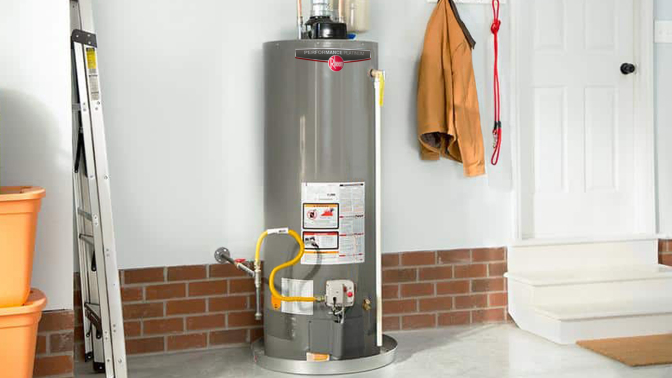April 8, 2025
Written by
HI-FLO WATER SEWER
Gas Water Heater Troubleshooting Tips
Gas water heaters are essential for providing hot water in homes, but like any appliance, they can encounter issues. Understanding common troubleshooting steps can help you identify and resolve problems efficiently before calling a professional.
Below, you will find a guide to the most frequent issues and how to address them safely.
Below, you will find a guide to the most frequent issues and how to address them safely.
Safety First
Before attempting any troubleshooting, ensure your safety by turning off the gas supply and allowing the water heater to cool down.
Gas water heaters involve flammable gas and scalding water, so proceed with caution.
If you're unsure or uncomfortable, contact a professional plumber such as HI-FLO Water & Sewer.
Gas water heaters involve flammable gas and scalding water, so proceed with caution.
If you're unsure or uncomfortable, contact a professional plumber such as HI-FLO Water & Sewer.
Pilot Light Problems
The pilot light is crucial for igniting the burner that heats the water.
If your pilot light is out, check to see if the gas line is on and ensure that the the shut-off valve is parallel to the gas line.
Relight the pilot by setting the gas valve to "pilot," pressing the pilot button, and ignite it using the igniter button or a match.
Hold the button for 15–60 seconds until the flame stays lit.
Inspect for issues: If the pilot light keeps going out, check for:
If your pilot light is out, check to see if the gas line is on and ensure that the the shut-off valve is parallel to the gas line.
Relight the pilot by setting the gas valve to "pilot," pressing the pilot button, and ignite it using the igniter button or a match.
Hold the button for 15–60 seconds until the flame stays lit.
Inspect for issues: If the pilot light keeps going out, check for:
- A dirty or worn thermocouple (clean or replace it).
- Air in the gas line (purge it by holding down the pilot button).
- A clogged pilot orifice (clean it).
Burner Issues
A faulty burner can prevent proper heating.
Check for any dirt or corrosion and clean or unclog the burner if necessary.
Assess the flame color.
A blue flame indicates proper combustion while yellow or orange flames may signal debris or insufficient air supply.
Check for any dirt or corrosion and clean or unclog the burner if necessary.
Assess the flame color.
A blue flame indicates proper combustion while yellow or orange flames may signal debris or insufficient air supply.
Thermostat Troubles
The water heater thermostat regulates water temperature.
Ensure that you verify the thermostat settings.
The recommended temperature is 120°F for safe and efficient operation of your water heater.
If temperature fluctuations occur, check for electrical faults or replace the most likely defective thermostat.
Continue for further water heater troubleshooting tips.
Ensure that you verify the thermostat settings.
The recommended temperature is 120°F for safe and efficient operation of your water heater.
If temperature fluctuations occur, check for electrical faults or replace the most likely defective thermostat.
Continue for further water heater troubleshooting tips.
Sediment Build-Up
Over time, sediment accumulates at the bottom of the tank, reducing efficiency.
You should regularly turn off and drain your water heater attaching a hose to the drain valve and flushing out sediment.
Make sure to also check the anode rod as part of your water heater troubleshooting.
If the anode rod is heavily corroded, replace it to prevent further damage to the tank.
You should regularly turn off and drain your water heater attaching a hose to the drain valve and flushing out sediment.
Make sure to also check the anode rod as part of your water heater troubleshooting.
If the anode rod is heavily corroded, replace it to prevent further damage to the tank.
Leaking Water Heater
Leaks on water heaters can usually result from loose valves or corrosion.
You should inspect all the valves and tighten loose connections or replace defective valves.
Ensure that you evaluate the condition of the tank.
Leaks that originate from the bottom of the tank usually mean that the water heater may need to be replaced entirely.
You should inspect all the valves and tighten loose connections or replace defective valves.
Ensure that you evaluate the condition of the tank.
Leaks that originate from the bottom of the tank usually mean that the water heater may need to be replaced entirely.
When To Call A Professional
Some problems require an expert's attention and you should avoid them unless you know what you are doing. These include:
Regular maintenance and prompt troubleshooting can extend your gas water heater's lifespan and ensure reliable performance.
However, always prioritize safety when dealing with gas appliances.
If you're unable to resolve an issue or suspect a serious problem, consult a licensed plumber such as HI-FLO Water & Sewer for assistance.
- Persistent leaks from tank components.
- Gas leaks (never attempt DIY repairs).
- Combustion issues like flickering flames or unusual odors
Regular maintenance and prompt troubleshooting can extend your gas water heater's lifespan and ensure reliable performance.
However, always prioritize safety when dealing with gas appliances.
If you're unable to resolve an issue or suspect a serious problem, consult a licensed plumber such as HI-FLO Water & Sewer for assistance.
If you’re in need of a professional water heater repair or water heater installation service, please do not hesitate to contact us via our contact form, directly via email or at our phone number at any time.
HI-FLO Water & Sewer

